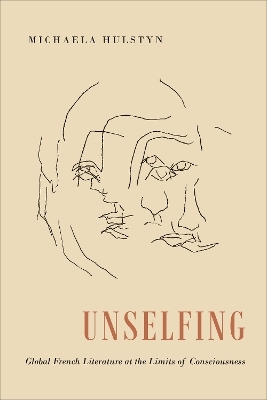
Unselfing
Global French Literature at the Limits of Consciousness
Seiten
2022
University of Toronto Press (Verlag)
978-1-4875-4376-1 (ISBN)
University of Toronto Press (Verlag)
978-1-4875-4376-1 (ISBN)
- Lieferbar (Termin unbekannt)
- Versandkostenfrei innerhalb Deutschlands
- Auch auf Rechnung
- Verfügbarkeit in der Filiale vor Ort prüfen
- Artikel merken
Unselfing offers an account of the ways that global French writers have tried to capture experiences when the ordinary sense of the self as a source of unity, stability, and authority has been radically altered.
Altered states of consciousness – including experiences of deprivation, pain, hallucination, fear, desire, alienation, and spiritual transcendence – can transform the ordinary experience of selfhood.
Unselfing explores the nature of disruptive self-experiences and the different shapes they have taken in literary writing. The book focuses on the tension between rival conceptions of unselfing as either a form of productive self-transcendence or a form of alienating self-loss.
Michaela Hulstyn explores the shapes and meanings of unselfing through the framework of the global French literary world, encompassing texts by modernist figures in France and Belgium alongside writers from Algeria, Rwanda, and Morocco. Together these diverse texts prompt a re-evaluation of the consequences of the loss or the transcendence of the self. Through a series of close readings, Hulstyn offers a new account of the ethical questions raised by altered states and shows how philosophies of empathy can be tested against and often challenged by literary works. Drawing on cognitive science and phenomenology, Unselfing provides a new methodology for approaching texts that give shape to the fringes of conscious experience.
Altered states of consciousness – including experiences of deprivation, pain, hallucination, fear, desire, alienation, and spiritual transcendence – can transform the ordinary experience of selfhood.
Unselfing explores the nature of disruptive self-experiences and the different shapes they have taken in literary writing. The book focuses on the tension between rival conceptions of unselfing as either a form of productive self-transcendence or a form of alienating self-loss.
Michaela Hulstyn explores the shapes and meanings of unselfing through the framework of the global French literary world, encompassing texts by modernist figures in France and Belgium alongside writers from Algeria, Rwanda, and Morocco. Together these diverse texts prompt a re-evaluation of the consequences of the loss or the transcendence of the self. Through a series of close readings, Hulstyn offers a new account of the ethical questions raised by altered states and shows how philosophies of empathy can be tested against and often challenged by literary works. Drawing on cognitive science and phenomenology, Unselfing provides a new methodology for approaching texts that give shape to the fringes of conscious experience.
Michaela Hulstyn teaches in the Structured Liberal Education program at Stanford University.
Introduction
1. Toward a Cognitive-Phenomenological Approach to the Self
2. What Is Unselfing?
3. Unselfing as Disruption: Self-Knowledge and Pain in Paul Valéry and Charlotte Delbo
4. Unselfing as Mutation: Hallucination and the Remains in Henri Michaux and Yolande Mukagasana
5. Unselfing as Fragmentation: Languages of Alterity in Abdelkebir Khatibi and Hélène Cixous
6. Unselfing as Destruction: De-creation and Inner Experience in Simone Weil and Georges Bataille
Conclusion: The Promise and Peril of Unselfing
| Erscheinungsdatum | 17.08.2022 |
|---|---|
| Reihe/Serie | University of Toronto Romance Series |
| Verlagsort | Toronto |
| Sprache | englisch |
| Maße | 159 x 235 mm |
| Gewicht | 520 g |
| Themenwelt | Geisteswissenschaften ► Philosophie ► Philosophie der Neuzeit |
| Geisteswissenschaften ► Philosophie ► Sprachphilosophie | |
| Geisteswissenschaften ► Sprach- / Literaturwissenschaft ► Anglistik / Amerikanistik | |
| Geisteswissenschaften ► Sprach- / Literaturwissenschaft ► Literaturwissenschaft | |
| ISBN-10 | 1-4875-4376-X / 148754376X |
| ISBN-13 | 978-1-4875-4376-1 / 9781487543761 |
| Zustand | Neuware |
| Haben Sie eine Frage zum Produkt? |
Mehr entdecken
aus dem Bereich
aus dem Bereich


